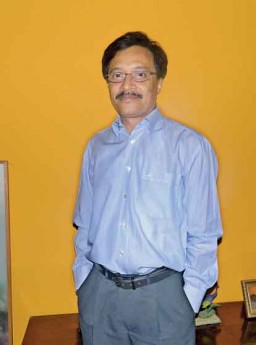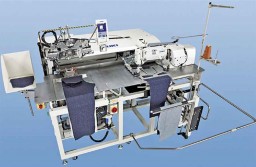
What would a sewing machine company do after acquiring near about 50% of market share in a country and supply… and become the apparel industry’s knowledge partner. And that’s exactly what the Japanese pioneer Juki has done in its presence of more than three decades in Bangladesh. In an exclusive interaction with Apparel Online, Shamsul Alam (Jahangir), Chief Operating Officer & General Manager, Juki Bangladesh Ltd., elaborates on his journey, spearheading Juki’s operations in the country and the new strategy of becoming the industry’s partners in sustainable growth.
Starting his career in Zakaria Enterprise Ltd., the sole agent of Juki in the Technical department early in 1980s, after doing a masters in social science from Dhaka University, Alam went to Japan for a 3 months training in 1984, and later to Singapore for 1 month training, as Juki didn’t have an office in Dhaka at that point, the relation lasted for 13 years. “Till 1986-87, the sewing machine market was practically zero and the real boom in the business came post-1990,” informed Alam, who also has the experience of working as a production DGM and merchandiser and also in marketing department of a shirt manufacturer and exporter under same umbrella of Zakaria Enterprises, named President Apparels Ltd.
Recalling the time when he started his career, Alam added, “Business was easier in the eighties as there was no competition in the market. But with the sourcing from the country increasing multi folds, there has been a huge increase in the sale of machines and with it the number of machine suppliers, keeping us at our toes all the time. Due to the increased flow of information and ease of communication, we need to keep tab on our competitors, continuously study the global market trends and interacting with our offices in other countries.” Being a multi-national sewing machine corporation, the omnipresence of Juki has made possible sharing of best practices from apparel manufacturing facilities around the globe.

The ‘consultancy’ aspect of Juki’s operations undertakes projects for productivity improvement, plant engineering, time study and method study under the theme of continuous improvement. For this, the company has employed 7 industrial engineers who have been trained in Sri Lanka, India, Japan, Indonesia and Vietnam. “The trained teams do layout planning and project estimation, before the selling of machines and after machine installation in the factory premises, the same team works on improving the productivity. You don’t need an industrial engineer for selling sewing machines, but for making the complete project successful,” averred Alam.
Moreover, these teams continuously visit factories, recognize the bottlenecks in not only individual processes but also the overall system. “For example if a company has a line of 50 machines we do motion and time study, and suggest them a new layout, there are scope 10% to 15% improvement in the output,” added Alam. The benchmarks for improvement are not defined by Juki, rather the global standards are taken into account and the basic target is to increase the efficiency from less than 50% to 65%, and improve the needle time from just 3 hours in an 8 hour shift, to at least 4 hours. All the above services are made available to the customers without any type of additional charges or capital investment.
When we started, people were sceptical about our methods and the results they would give, but now people are calling me up and asking for industrial engineers.” Shamsul Alam (Jahangir), Chief Operating Officer & General Manager, Juki Bangladesh Ltd.
The factory, one of the biggest lingerie manufacturers in Dhaka, highlights the expertise and finesse of Juki’s plant engineering operations. “New production system was designed by our team similar to a Sri Lankan lingerie factory. Six years ago our Japanese expert Satoshi Sasaki, with local plant engineering team who setup the factory, further suggested the lines to be converted to single piece flow using side-by-side layout. Within one week they changed the whole layout as prescribed by Juki’s plant engineering team. They improved 54% productivity with the existing machineries and reduced 60% helpers. After getting major improvements, even the T-shirt and polo shirt lines were also changed,” shared Alam. Juki plant engineering team does not leave the factory immediately after achieving the desired results but also giving on-the-job-training to the production staff with the agenda of continuous improvement, in the back of their mind. More than 200 apparel manufacturing factories in Bangladesh already received Juki plant engineering supports for improving productivity and working environment.
Juki has received tremendous appreciation for these consultancy services initiated in 1995. “When we started, people were sceptical about our methods and the results they would give, but now people are calling me up and asking for industrial engineers,” said Alam. The only monetary aspect of this business is the paid seminars conducted by Juki in the factory premises for production and industrial engineering department staff. “These seminars last for 3 to 5 days and cover the aspects of time study, motion study, to production design and layout, from basic to advance level. The second type of seminars done by us are focussing on slight changes that can be done on the shop floor, for achieving tremendous results and respective examples are shown from various facilities around the world,” added Alam.
Talking about the R&D operations of Juki, Alam proudly states, “Juki is spending more than 20 million dollar per annum on R&D and it works in close collaboration with us. We not only reach out to the customers for their feedback and take note of their requirements and issues with the machine, but also the sewing operator’s feedback.” The new challenge that the R&D of Juki faces is that the new models have to be higher in specification but lower in the price when compared to older models. Although not possible with every type of sewing machine, this exercise never comprises on the quality of the sewing machine.
For sustenance of the industry in Bangladesh, Alam urges the industry to ‘clean-up’ in terms of organizational health and safety. “Not only in terms of compliance, we also had to work towards improving the production systems and productivity of our factories. This is the need of the hour and it will make our future easier,” concluded Alam.






